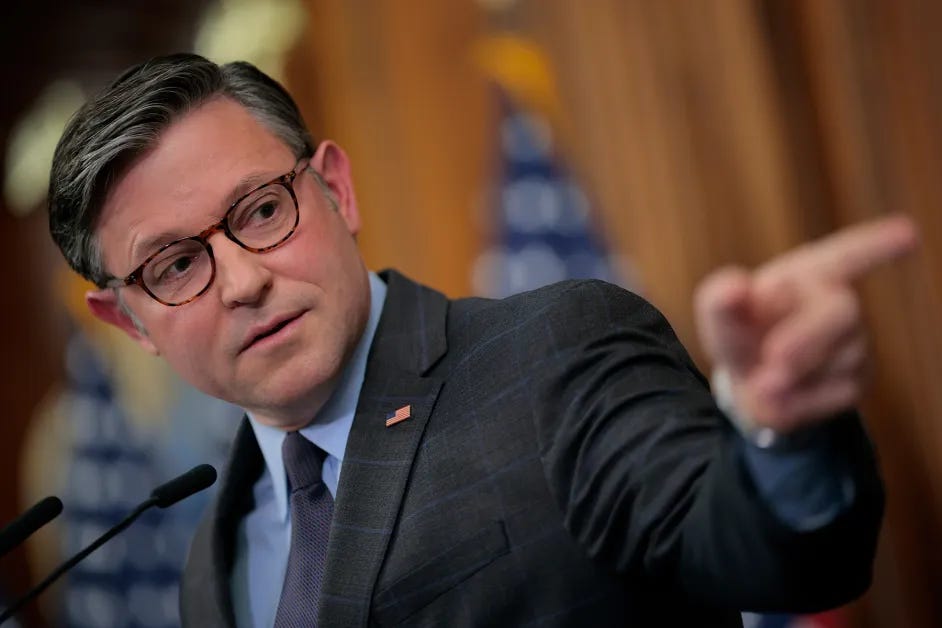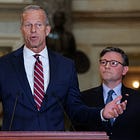Johnson’s shutdown strain spills into public view
The speaker’s frustration mirrors a GOP conference under pressure to remain united, while Democrats press their case to reopen the government and protect Americans’ health care on bipartisan terms.

House Speaker Mike Johnson’s frustration boiled over Friday morning as he blamed Democrats for federal workers receiving only partial paychecks amid a prolonged government shutdown that’s now expected to stretch into next week, potentially leaving active-duty military without pay for the first time in years.
The agitation the Louisiana Republican expressed at his daily shutdown press conference capped a week of visible strain inside the Republican conference, with some lawmakers lashing out at colleagues and Democrats alike over the stalemate.
As Once Upon a Hill reported earlier this week, the episode underscores how Johnson has become increasingly boxed in by the politics of his own making as a speaker caught between the demands of a restless right flank, the expectations of a disengaged president and the realities of a government he helped grind to a halt.
Still, it’s hard to tell how much of Johnson’s feelings are genuine and how much is performance. And there’s a striking irony in watching the speaker defend the federal workforce at a time when the Trump administration has dismantled agencies, fired hundreds of thousands of government employees and clawed back billions in approved spending—actions many Republicans, including Johnson himself, have long supported.
Meanwhile, Democrats, for their part, have refused to reopen the government without extending the Affordable Care Act’s enhanced premium tax credits and new limits on executive overreach by President Donald Trump and his budget director Russell Vought. As the subsidy cliff nears and Trump remains preoccupied with other priorities, Johnson is preparing to keep the House out of session for another week—a sign of how the political and personal weight of the shutdown is bearing down on him.
“I don’t get why my colleagues on the other side of the aisle are getting emotional about their failed approach, their my-way-or-the-highway approach to governing, as if we’re supposed to just bend the knee to extreme Republican demands and join them in passing a partisan Republican spending bill that guts the health care of the American people,” House Minority Leader Hakeem Jeffries (D-N.Y.) told Once Upon a Hill on Friday afternoon.
The strain wasn’t limited to Johnson. Across the Capitol on Wednesday, tempers flared in a series of confrontations that captured just how frayed relationships between the parties have become as the shutdown drags on.
In one of the day’s more tense moments, Democratic Arizona senators Mark Kelly and Ruben Gallego walked across the Capitol to demand Johnson swear in their state’s newest member, Rep.-elect Adelita Grijalva, who is set to become the final signatory on a bipartisan discharge petition to compel the release of the Jeffrey Epstein files, a procedural step Johnson has resisted. It reflected both the mounting outrage within the Arizona delegation and the broader frustration among Democrats who viewed the delay as a partisan maneuver with real investigative and representative consequences.
Kelly and Gallego weren’t alone. Later in the day, Rep. Greg Stanton (D-Ariz.) and members of the state’s Democratic delegation were denied recognition that Grijalva be sworn in. Stanton erupted in protest, admonishing Republicans for what they described as a ceremonial step Johnson had taken for three other members within 24 hours of their special election victories this year.
Shortly before the floor drama, Rep. Mike Lawler, one of the House’s most vocal swing-district Republicans, confronted Jeffries in a Capitol hallway following a Democratic leadership press conference to press the top House Democrat to sign onto a one-year extension of the ACA subsidies and ask when he planned to endorse New York City Democratic mayoral candidate Zohran Mamdani in the general election. Jeffries characterized Lawler as a lackey for Johnson and President Trump and mocked the politician for declining to run for governor so Trump could clear the field for another New York Republican, Rep. Elise Stefanik.
While the political theatrics have become a defining feature of Washington’s modern dysfunction, the stakes of this shutdown extend far beyond the marble hallways. Millions of Americans are already feeling the strain, from federal employees seeing only partial wages to families missing housing vouchers, nutrition assistance and veterans’ benefits delayed in processing. Airport security lines have grown longer as TSA workers call out sick. Small businesses that rely on federal contracts or loan guarantees are tightening budgets. And federal courts, food inspections and disaster response operations are scaling back as agencies exhaust their contingency plans.
Ahead of the shutdown, the Trump administration signaled it would use its authority to carry out a sweeping reduction-in-force plan to shrink the federal workforce and limit agency functions. Officials also made clear they would freeze or eliminate funding for projects in Democratic-leaning states and cities as part of a broader strategy to consolidate control over the executive branch. On Friday, Vought confirmed that those layoffs formally began with thousands of federal employees expecting termination notices as part of what the White House calls a government efficiency initiative.
The combined effect is a slow-motion erosion of basic government function, which cuts deepest among the workers and communities least equipped to weather it. As the political standoff drags on, the contrast between Washington’s performative clashes and the quiet hardship spreading across the country will only grow sharper.
But Democrats insist they’re prepared to see their strategy through, arguing the only way to break the stalemate is to keep their case in front of the American people. Party leaders are hammering House Republicans for remaining out of town while millions feel the fallout, noting that most GOP members have now been away from Washington for nearly a month, with no sign the speaker plans to call them back before another unscheduled recess week begins. (Jeffries asked his members to return next week on a caucus call on Friday afternoon.)
“We should keep the focus on the health, the safety and the well-being of the American people,” Jeffries told OUAH. “We were here last week. We’re here this week. We will continue to be here to make clear to the American people, to our hard-working federal employees, to our men and women in uniform, and to the country that we want to find a bipartisan path forward, that we want to reopen the government. We need to reopen it now, and we need to address the Republican health care crisis that’s devastating people across the country.”


